
Are you looking for ways to create harmony and efficiency in your household? Family chores play a crucial role in teaching responsibility, life skills, and the value of teamwork.
This article explores how assigning tasks is based on 6 distinct age categories.
After reading this article, you’ll learn how to implement age-appropriate chores, help accountability, and build a sense of unity within your family.
Let’s learn these practical tips and chore ideas to make household responsibilities fair, fun, and effective for every family member!
Why Family Chores Matter

Family chores are vital for teaching life skills and responsibility. A weekly chores list ensures tasks are divided fairly. Household chores like cleaning the dining room, organizing kitchen cabinets, and loading the dishwasher teach children about teamwork.
Chores for teenagers, such as managing clean clothes, prepare them for independence. Regular weekly chores help kids develop a strong work ethic and contribute to the household.
These tasks lay the foundation for effective life planning and time management. When everyone helps with the house and its upkeep, it fosters a sense of unity. By involving children in daily tasks, families build a shared sense of accomplishment and ensure a well-maintained home.
See also Top 10 Responsibilities of a Father: Core Duties for a Dad
Creating a Family Chore Schedule
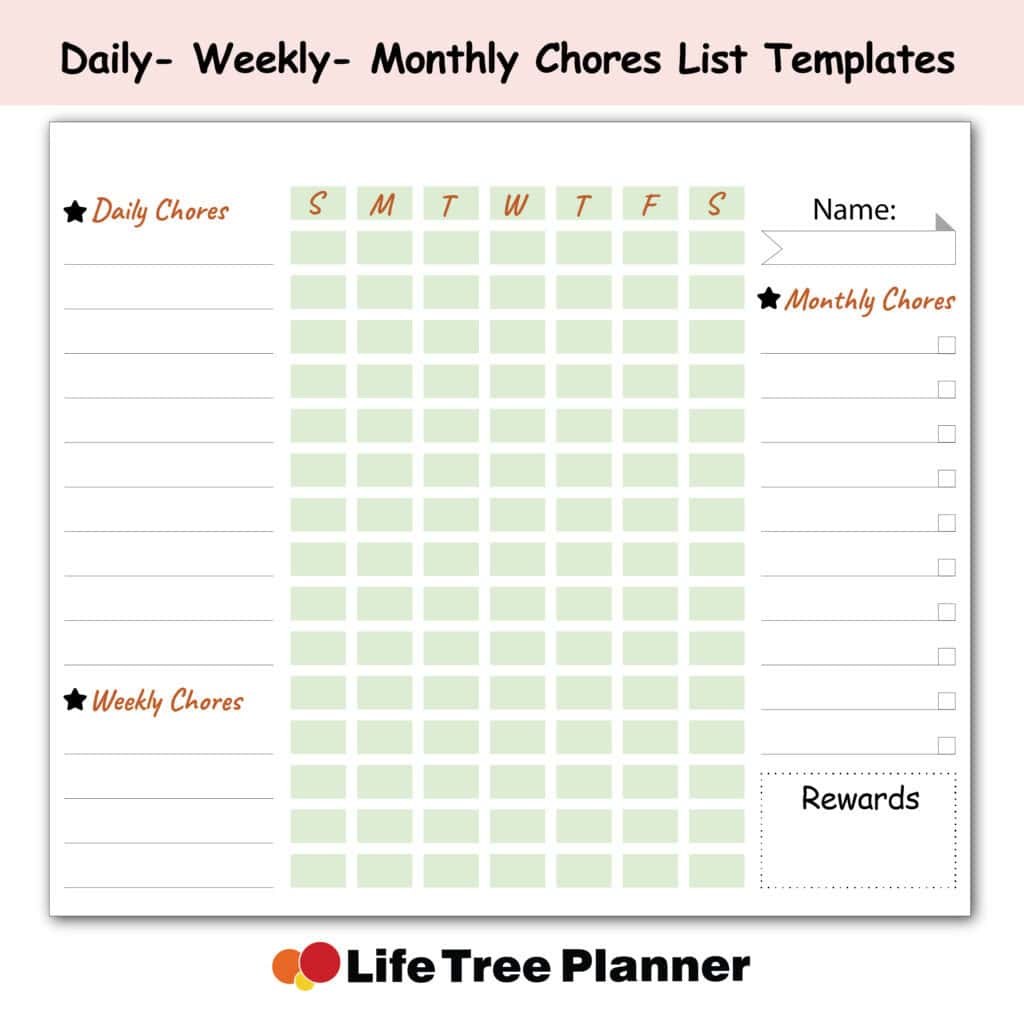
A family chore schedule ensures tasks are done efficiently. It divides chores fairly among members and keeps the house clean. Use a chores list template to start. Include daily household chores, like tidying the dining room. Clarify chores vs responsibilities to teach accountability.
- Prioritize chores based on daily and weekly needs.
- Assign each member tasks suited to their abilities.
- Create a fun reward system for completed chores.
- Use a family calendar or board for tracking.
- Schedule time for regular family discussions about the system.
Age-Appropriate Chore Ideas
1. For Young Children (Ages 3-7)
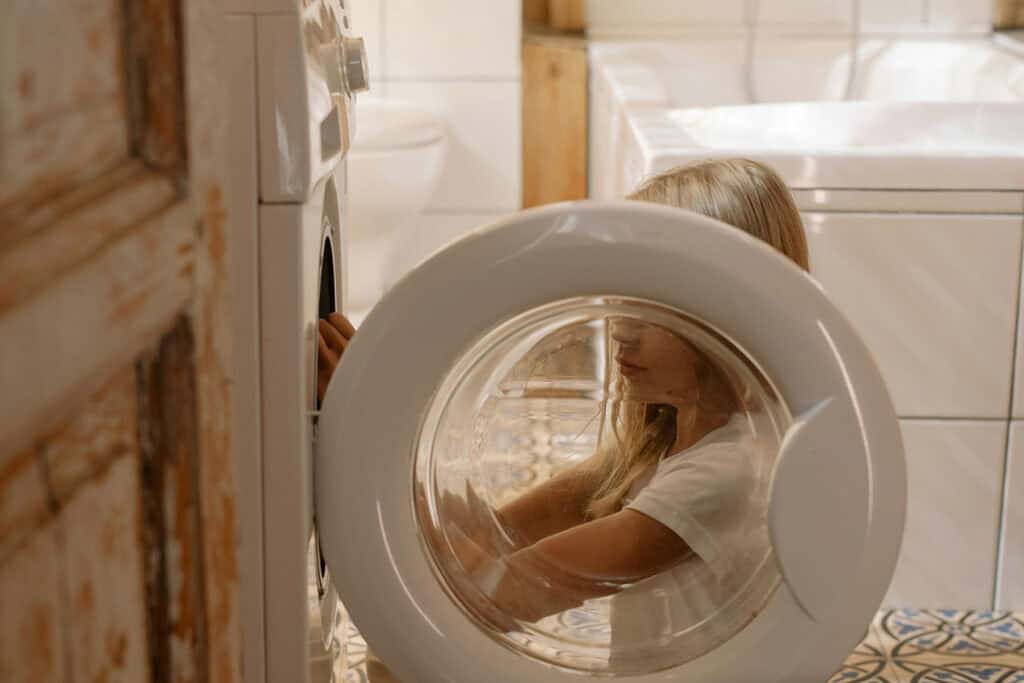
Even small children can handle simple chores. These tasks build confidence and teach the basics of responsibility.
- Put Away Toys
After playtime, encourage kids to tidy up their toys. This develops organization skills and respect for their belongings. - Set the Table
Guide them in placing utensils, napkins, and plates. This small task connects them to family routines. - Feed Pets
Under supervision, let them measure and pour food for pets. It teaches care and routine. - Sort Laundry
Show them how to separate clothes by color. It’s an easy way to introduce teamwork in household tasks. - Water Plants
With a small watering can, they can help care for indoor plants. This builds a connection to nature. - Dust Low Surfaces
Provide a microfiber cloth and let them wipe low shelves or furniture. It’s simple and safe. - Pick Up Clothes
Encourage them to place dirty clothes in the laundry hamper. - Help with Grocery Unpacking
Let them handle lightweight items like snacks or fruits.
2. For Older Children (Ages 8-12)
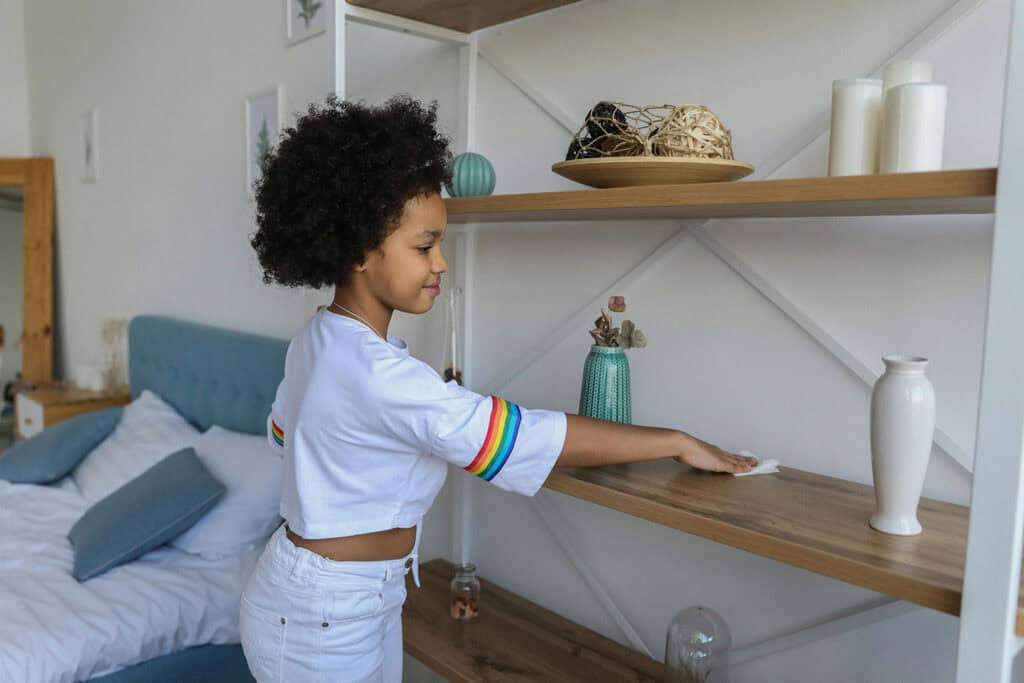
Older kids can manage more responsibility and develop skills they’ll use throughout life.
- Make Their Bed
Ask them to tidy up their bed daily. It’s a quick task that creates a habit of neatness. - Load and Unload the Dishwasher
Teach them to handle dishes safely and organize them in cupboards. - Take Out the Trash
Show them how to tie up trash bags and place them in outdoor bins. - Vacuum or Sweep Floors
Let them use lightweight vacuums or brooms to clean the floors. - Fold Laundry
Guide them in folding clothes neatly and sorting them by family member. - Prepare Simple Snacks
Allow them to make basic foods like sandwiches or cut fruit using safe tools. - Clean Bathroom Counters
Provide a damp cloth and cleaner for wiping sinks and counters after use. - Help Wash the Car
Turn car washing into a fun family activity by involving them in rinsing or drying.
3. For Teenagers (Ages 13-17)

Teenagers can handle more complex tasks, preparing them for independent living.
- Cook Simple Meals
Teach them to follow basic recipes and use kitchen tools responsibly. - Mow the Lawn
Show them how to operate a mower and care for the yard. - Do Laundry from Start to Finish
Let them wash, dry, fold, and put away their clothes. - Clean the Bathroom
Assign them to scrub sinks, toilets, and bathtubs using proper cleaning supplies. - Babysit Younger Siblings
Encourage them to care for younger siblings by entertaining them and ensuring safety. - Run Errands
If they drive or bike, send them on small errands like picking up groceries. - Help with Budgeting
Teach them to assist with planning family expenses or tracking bills. - Organize Shared Spaces
Involve them in tidying the garage, closets, or storage rooms.
See also Stay at Home Mom Responsibilities: 8 Duties and Essential Tips
4. For Mothers

Mothers often juggle multiple roles, and these tasks reflect their contributions to the household.
- Meal Planning and Grocery Shopping
Organize weekly meals and shop for essentials to keep the family nourished. - Paying Bills
Oversee finances and ensure timely payments of utilities or rent. - Home Organization
Declutter and organize spaces like the pantry, closets, or storage areas. - Supervising Chores
Guide children and ensure they complete their assigned tasks. - Laundry for the Household
Handle linens, towels, and larger family laundry loads. - Emotional Support
Create a loving, supportive environment for every family member. - Managing Family Schedules
Coordinate school, work, and extracurricular activities efficiently. - Planning Celebrations
Organize family birthdays, holidays, and other special events.
5. For Fathers
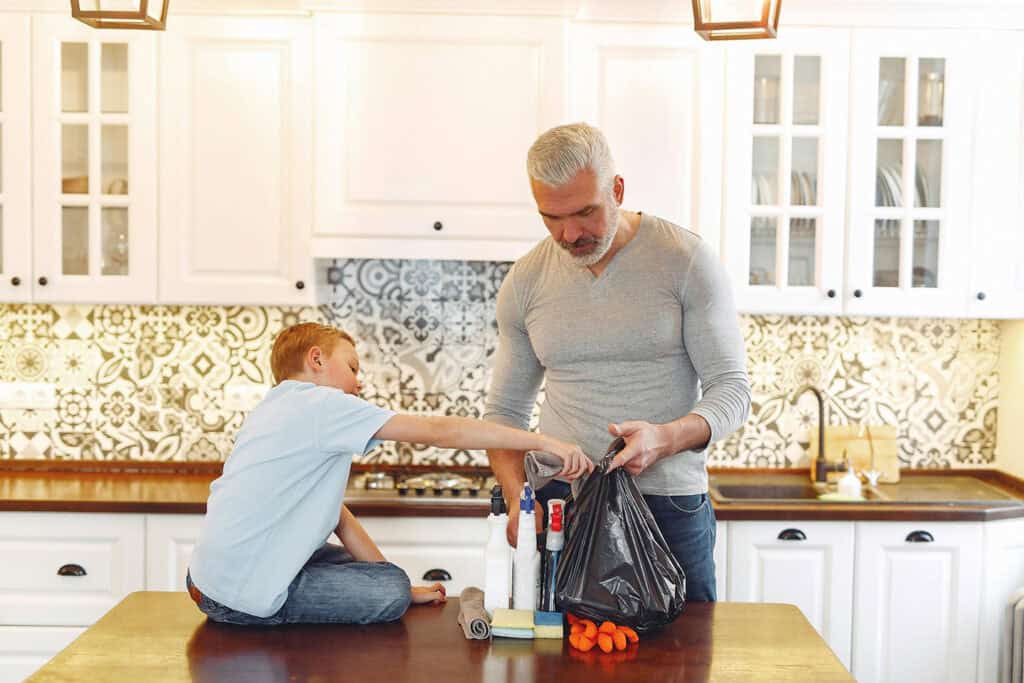
Fathers often take on tasks that require physical effort or involve maintenance.
- Home Repairs and Maintenance
Fix broken items and oversee the upkeep of appliances and structures. - Yard Work and Gardening
Mow the lawn, trim hedges, and maintain outdoor spaces. - Vehicle Maintenance
Ensure cars are cleaned, fueled, and serviced regularly. - Assembling Furniture
Handle assembly of new furniture or repairs. - Heavy Lifting Tasks
Move furniture or carry heavy items during clean-ups or rearranging. - Teaching Life Skills
Guide children in tasks like DIY repairs, budgeting, or basic mechanics. - Financial Planning
Oversee savings, investments, and long-term family financial goals. - Safety Checks
Ensure smoke detectors, fire extinguishers, and locks are in working condition.
6. For Grandparents (If Living Together)

Grandparents bring wisdom and support to family life.
- Storytelling or Babysitting
Entertain younger kids with stories or care for them when parents are busy. - Folding Laundry
Help with folding towels, sheets, or smaller items. - Watering the Garden
Tend to plants while enjoying time outdoors. - Organizing Family Photos
Sort and label old photos for family keepsakes. - Light Dusting
Clean surfaces within easy reach. - Meal Prep Assistance
Assist with chopping or seasoning dishes. - Knitting or Crafting
Create handmade items like blankets or scarves for the family. - Sharing Advice
Offer guidance and solutions based on their life experiences.
The Benefits of Shared Responsibilities
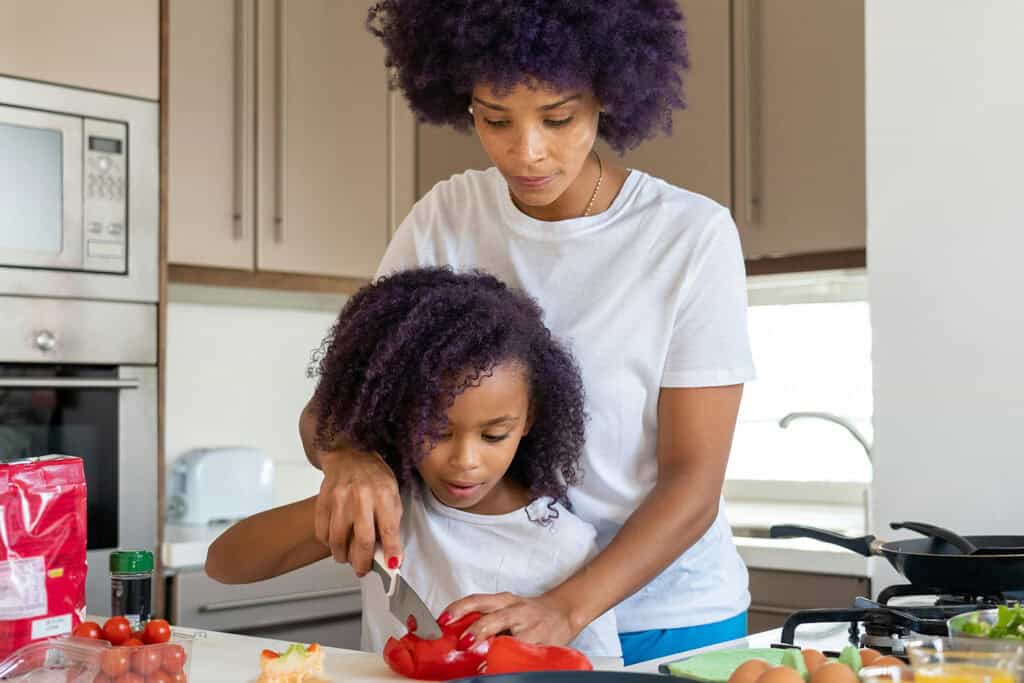
When everyone contributes, the household runs smoothly. Sharing chores reduces stress, builds teamwork, and strengthens family bonds. Dividing responsibilities also ensures no one feels overwhelmed, creating a positive home environment where everyone feels valued.
Take these ideas and create a fair schedule that works for your family. Together, you can keep your home happy and organized!
Here are 10 benefits:
- Promotes Teamwork
Working together helps cooperation and strengthens family bonds. - Reduces Stress
Dividing tasks ensures no single person feels overwhelmed by household duties. - Teaches Life Skills
Sharing responsibilities helps children and teenagers develop essential skills for independence. - Encourages Accountability
Each family member learns to take ownership of their tasks. - Improves Time Management
Sharing chores allows the family to manage time more effectively, creating space for leisure. - Enhances Communication
Discussing and coordinating responsibilities improves communication skills. - Boosts Productivity
With everyone contributing, tasks are completed faster and more efficiently. - Helps a Sense of Contribution
Everyone feels valued for their efforts, increasing satisfaction and self-esteem. - Supports Equality
Sharing tasks encourages fairness and respect among family members. - Creates a Cleaner Environment
A well-maintained home benefits everyone’s physical and mental wellness.
See also Parents’ Responsibilities: 15 Key Duties for Raising Happy Kids
Family Chores: A Recap
Incorporating chores into family life builds responsibility and unity. Assign age-appropriate tasks, such as chores for 9-12-year-olds, to foster independence. Household chores like bathroom cleaning or weekly room tidying teach children life skills.
Creating a life responsibilities list ensures that every child has clear expectations. For instance, kids can help keep the house clean by organizing their belongings. Encourage teamwork and reward efforts to make chores enjoyable.
Consistency in assigning chores ensures a smoothly run household. This balance prepares children for future responsibilities while maintaining a clean and organized home.


